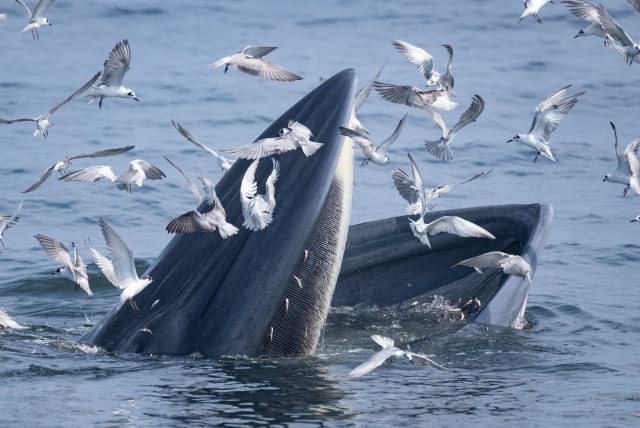Ancient Norse texts may have described rare whale feeding method

The feeding method of the Norse hafgufa monster is similar to the feeding method recorded in a video of a whale in 2011.
An unusual whale feeding method recorded in 2011 may have been used by whales for centuries, according to a new study published on Tuesday.
The study compared the video from 2011 with ancient texts describing the Norse monster known as the hafgufa and concluded that the hafgufa was based on whales.
The most known way that whales catch food is by lunging at fish and trapping them in their mouth, but a video that went viral on Instagram in 2011 showed a whale staying still on the surface with its mouth open while fish swim in. As soon as the whale had a large amount of fish, it closed its mouth and ate them.
View this post on Instagram
This method is similar to that described in regard to the mythical Norse monster. According to myth, the hafgufa is a massive sea monster that looks like an island on top. The hafgufa belches out food for fish to attract them and waits with its mouth open while its prey gathers inside and then eats them.
“It struck me that the Norse description of the hafgufa was very similar to the behavior shown in videos of trap-feeding whales, but I thought it was just an interesting coincidence at first," said Dr. John McCarthy. "Once I started looking into it in detail and discussing it with colleagues who specialize in medieval literature, we realized that the oldest versions of these myths do not describe sea monsters at all, but are explicit in describing a type of whale."
The researchers involved in the study believe that people thousands of years ago saw whales eating using this strategy and designed the myth around them.
The whale recorded in 2011 was a type of Byrde whale which usually favors warmer waters, so it is unlikely that this is the species the Norse people saw 2,000 years ago. If the researchers are correct in their theory, it would mean that a variety of whale species use the same strategy.
Why have modern people not seen this method?
As to why people have not seen whales eat like this regularly, the scientists theorized that their eating strategy had changed due to changing environmental conditions. The other reason could be that people are only seeing this strategy now because whales are being more closely monitored than ever before.
“It’s exciting because the question of how long whales have used this technique is key to understanding a range of behavioral and even evolutionary questions," said Research co-author Dr. Erin Sebo. "Marine biologists had assumed there was no way of recovering this data but, using medieval manuscripts, we’ve been able to answer some of their questions.
"We found that the more fantastical accounts of this sea monster were relatively recent, dating to the 17th and 18th centuries and there has been a lot of speculation amongst scientists about whether these accounts might have been provoked by natural phenomena, such as optical illusions or underwater volcanoes. In fact, the behavior described in medieval texts, which seemed so unlikely, is simply whale behavior that we had not observed but medieval and ancient people had.”
Jerusalem Post Store
`; document.getElementById("linkPremium").innerHTML = cont; var divWithLink = document.getElementById("premium-link"); if (divWithLink !== null && divWithLink !== 'undefined') { divWithLink.style.border = "solid 1px #cb0f3e"; divWithLink.style.textAlign = "center"; divWithLink.style.marginBottom = "15px"; divWithLink.style.marginTop = "15px"; divWithLink.style.width = "100%"; divWithLink.style.backgroundColor = "#122952"; divWithLink.style.color = "#ffffff"; divWithLink.style.lineHeight = "1.5"; } } (function (v, i) { });

